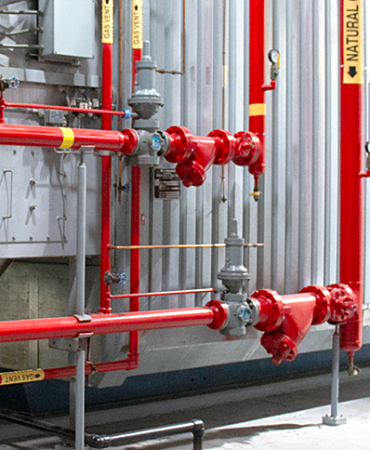Natural gas serves as a primary fuel source for steam generation for the Metro Nashville District Energy System (MNDES). Commercial natural gas service is available under both interruptible and firm service agreements with firm service costing significantly more per unit of gas consumed. MNDES maintains an interruptible natural gas service agreement which means lower natural gas costs per unit. In periods of unusually high demand for natural gas energy, MNDES can be curtailed or limited on its consumption by the natural gas distributor in Nashville, and consumption above allotment volumes can be extremely expensive.
MNDES is able to operate with an interruptible natural gas service because it maintains a readily available back-up fuel supply of propane to run the boilers. Propane is purchased on the open market, typically in late summer when prices are historically at their lowest point in the year, and in sufficient volumes to ensure positive economies of scale. The majority of the propane is then stored off-site for a single seasonal cycle. Sufficient on-site capacity is maintained to make the transition from natural gas in the event of Operational Flow Order (restriction) or curtailment, and to manage delivery of the propane tanker trucks from the off-site storage facility.
During January 2024, Nashville experienced temperatures well below average for a period of several days in a row. During this period, the MNDES plant required more fuel to meet customer demands than was available under its interruptible service agreement, so it began burning propane and scheduled supplemental propane delivered to the facility for consumption to avoid being charged the market daily rate for natural gas volume above the plant's flow allotment. In a separate and supplemental move, Constellation, the contract operator of MNDES, was able to divert a volume of natural gas to the plant drawing from an allotted but unused supply of another of its major industrial customers in the greater Nashville area at a price well below the market daily rate of natural gas during the Operational Flow Order.
Because MNDES had standby fuel available, the system avoided approximately $7,000 in higher daily rate natural gas costs. By utilizing the fuel diverted by Constellation to the plant an additional $8,000 was saved. Had MNDES not been able to change over to these alternate fuel supply options, the cost to customers would have been more than $15,000 higher during these extreme temperature days.
The benefit of being part of MNDES is two-fold: customers have an alternate fuel supply option and sufficient supply of back-up fuel ensuring reliable service even in periods of extreme fuel demand, and MNDES customers realize significant cost savings over typical commercial gas customers with non-interruptible service.
For more information about this topic or other NDES questions, contact Dan Coyle at 615-264-2611.

